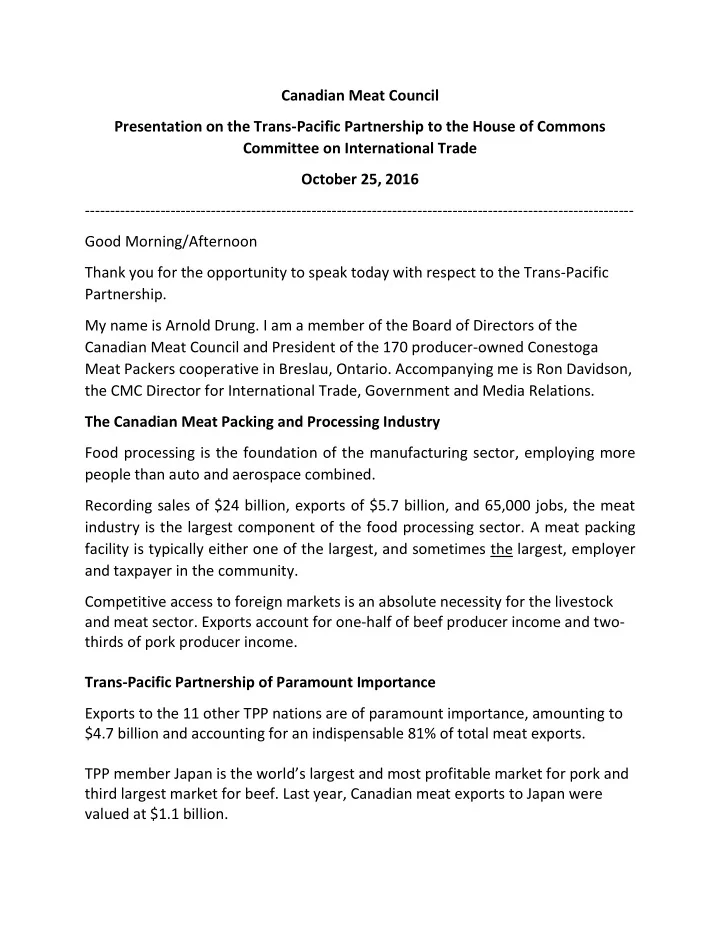

Canadian Meat Council Presentation on the Trans-Pacific Partnership to the House of Commons Committee on International Trade October 25, 2016 ------------------------------------------------------------------------------------------------------------- Good Morning/Afternoon Thank you for the opportunity to speak today with respect to the Trans-Pacific Partnership. My name is Arnold Drung. I am a member of the Board of Directors of the Canadian Meat Council and President of the 170 producer-owned Conestoga Meat Packers cooperative in Breslau, Ontario. Accompanying me is Ron Davidson, the CMC Director for International Trade, Government and Media Relations. The Canadian Meat Packing and Processing Industry Food processing is the foundation of the manufacturing sector, employing more people than auto and aerospace combined. Recording sales of $24 billion, exports of $5.7 billion, and 65,000 jobs, the meat industry is the largest component of the food processing sector. A meat packing facility is typically either one of the largest, and sometimes the largest, employer and taxpayer in the community. Competitive access to foreign markets is an absolute necessity for the livestock and meat sector. Exports account for one-half of beef producer income and two- thirds of pork producer income. Trans-Pacific Partnership of Paramount Importance Exports to the 11 other TPP nations are of paramount importance, amounting to $4.7 billion and accounting for an indispensable 81% of total meat exports. TPP member Japan is the world’s largest and most profitable market for pork and third largest market for beef. Last year, Canadian meat exports to Japan were valued at $1.1 billion.
-2- Second only to the United States, Japan accounted for $944 million of Canadian pork exports, equivalent to 56% of shipments to non-U.S. destinations. The TPP will greatly reduce the impact of the very protective “gate price” system. Following the United States, China and Mexico, Japan was the fourth largest foreign destination for Canadian beef, accounting for sales of $94 million, equivalent to 14% of shipments to non-U.S. destinations. The TPP will substantially reduce import tariffs from 38.5 to 9%. Canada is losing competitive market access to the Japanese market as a result of the Australia-Japan Free Trade Agreement. To date, Australian beef producers and processors have accumulated a 7% tariff advantage on frozen beef and 10% advantage on fresh, chilled beef. Market access disparities will continue to increase until they reach 15% and 19%, respectively. Furthermore, European meat packers are urging the EU Commission to conclude negotiation of the Japan-EU Economic Partnership Agreement. The Regrettable and Costly Lesson of South Korea Canadian farmers and meat processors cannot relive, in the case of the TPP, the destructive experience of South Korea when Canadian negotiators retreated from leading to trailing their European and U.S. counterparts. The Canada-Korea negotiations drifted from first to last and Canadian meat exports plummeted by 64 percent within two years. Opportunities for Increased Meat Exports to Other TPP Markets Also of interest are Malaysia, Singapore and Vietnam, to which meat sales totalled $1.3, $12.0, and $5.8 million, respectively. Exports to these countries are projected to grow significantly following implementation of the TPP. Additional countries are expected to join the TPP. Terms of accession will be established by the initial TPP members. It is preferable to be a founding member than to stand in line waiting and then pay for membership at a subsequent date. -3-
The Status Quo Will Not Exist Post-TPP The moment the TPP enters into force, the status quo will no longer exist. To place the risk of non-membership in the TPP in perspective, the $1.1 billion of actual sales at risk in Japan are greater than the “ up to ” $1.0 billion of potential sales under the CETA. Furthermore, failure to participate in TPP would jeopardize not only $1.1 billion of current meat exports, it would forfeit $500 million in new export potential in Asia. Moreover, whereas CETA places caps on export potential in Europe, TPP uncaps sales opportunities in Asia, including in Canada’s most valuable overseas market. Time to Solidify, Not Relinquish, Market Access Parity In summary, the loss of competitive access to TPP markets, particularly Japan, would be devastating for Canadian feed grain and livestock farmers, meat industry workers, and the numerous municipalities across this country in which they live, work and pay taxes. Conversely, participation in the TPP will permit Canada’s meat industry to solidify, rather than relinquish, market access parity with other signatories, thereby allowing the livestock and meat sector to expand production, increase exports, maintain competitiveness, increase jobs, enhance economic growth, and slow the hollowing out of rural Canada. Thank You -4-
Recommend
More recommend